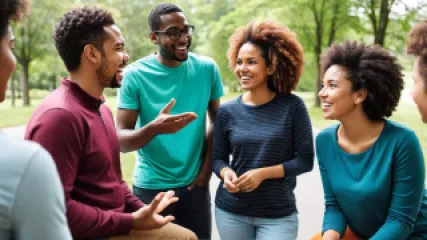Enhancing Social Skills: My Journey to Improve Social Adaptability
As someone who has struggled with social anxiety for most of my life, I know firsthand how challenging it can be to navigate social situations. The fear of judgment, rejection, and embarrassment often held me back from fully engaging with others and forming meaningful connections. However, through therapy for social anxiety and a commitment to personal growth, I embarked on a journey to enhance my social skills and improve my social adaptability. In this article, I will share my experiences, techniques, and insights that have helped me along the way.
Understanding Social Anxiety
Social anxiety is more than just shyness or introversion; it is a debilitating fear of social interactions that can significantly impact an individual's quality of life. It often manifests as excessive self-consciousness, fear of being scrutinized, or a constant worry of saying or doing something embarrassing.
If left unaddressed, social anxiety can lead to feelings of isolation, low self-esteem, and hinder personal and professional growth. Recognizing the need for change, I sought therapy for social anxiety and discovered various strategies to overcome my challenges.
The Power of Therapy
Therapy became a pivotal tool in my journey to enhance my social skills and improve my social adaptability. Through regular sessions with a qualified therapist, I learned techniques to challenge negative thought patterns and develop healthier coping mechanisms.
One of the most effective therapies for social anxiety is cognitive-behavioral therapy (CBT). CBT helps individuals identify and reframe irrational thoughts and beliefs that contribute to social anxiety. By challenging these distorted thinking patterns, I was able to gain a more realistic perspective and reduce the intensity of my fears.
In addition to CBT, other therapeutic approaches such as exposure therapy and mindfulness-based interventions can also be beneficial in addressing social anxiety. These therapies gradually expose individuals to feared social situations and teach them relaxation techniques to manage anxiety symptoms.
Online Social Skills Training
While therapy provided the foundation for my progress, I also sought additional resources to supplement my growth. One invaluable tool I discovered was online social skills training. These programs offer structured modules and interactive exercises that help individuals develop and practice essential social skills.
Online social skills training provides a convenient and accessible way to learn at your own pace. The flexibility of these programs allowed me to fit training sessions into my schedule and revisit lessons whenever necessary. Through online platforms, I gained valuable insights into effective communication, active listening, assertiveness, and non-verbal cues.
Furthermore, online social skills training often includes opportunities for virtual role-playing and feedback, allowing individuals to practice their new skills in a safe environment. This hands-on approach helped me build confidence and gradually apply what I had learned to real-life interactions.
Embracing Social Challenges
Improving social skills requires actively seeking out social challenges and stepping outside of one's comfort zone. Instead of avoiding social situations, I made a conscious effort to embrace them as opportunities for growth.
Attending social events, joining clubs or organizations, and participating in group activities provided me with ample chances to practice my newly acquired skills. While initially intimidating, each interaction became a chance to refine my abilities and overcome my fears.
It's important to remember that progress is not linear, and setbacks are a natural part of the journey. There were times when I felt discouraged or experienced moments of heightened anxiety. However, I learned to view these setbacks as valuable learning experiences and reminders of my resilience.
The Role of Self-Care
Enhancing social skills and improving social adaptability requires a holistic approach that encompasses self-care. Taking care of my physical and mental well-being became a crucial aspect of my journey.
Regular exercise, adequate sleep, and a balanced diet helped me manage stress and maintain a positive mindset. Engaging in activities I enjoyed, such as hobbies or creative outlets, provided a sense of fulfillment and increased my self-confidence.
Mindfulness practices, such as meditation or deep breathing exercises, helped me stay present in social situations and reduce anxiety. By cultivating self-awareness and practicing self-compassion, I developed a stronger sense of self and a greater capacity for emotional regulation.
Building a Support System
Embarking on a journey to enhance social skills can feel overwhelming at times. Having a supportive network of friends, family, or fellow individuals on a similar path can make a significant difference.
I was fortunate to have understanding friends who encouraged and supported me throughout my journey. We practiced social skills together, shared our progress, and celebrated each other's successes. Additionally, joining support groups or online communities dedicated to social anxiety and social skills improvement provided a sense of belonging and a platform for exchanging experiences and advice.
Navigating Social Media
In today's digital age, social media plays a significant role in our lives. While it can offer opportunities for connection, it can also exacerbate social anxiety and feelings of inadequacy.
During my journey, I became mindful of my social media consumption and developed healthier habits. Instead of comparing myself to others or seeking validation through likes and comments, I used social media as a tool for inspiration and connection. Following accounts that shared motivational content, self-improvement tips, and stories of personal growth helped shift my perspective and fostered a more positive mindset.
Embracing Continuous Growth
Enhancing social skills and improving social adaptability is an ongoing process. It requires patience, self-reflection, and a commitment to continuous growth.
Throughout my journey, I have come to appreciate that social skills are not fixed traits but rather a set of learnable abilities. By adopting a growth mindset and embracing opportunities for improvement, I have witnessed significant positive changes in my social interactions and overall well-being.
Remember, everyone's journey is unique, and progress may vary. What matters most is your willingness to take the first step and embark on the path towards enhancing your social skills. With therapy, online resources, self-care, and a supportive network, you too can improve your social adaptability and experience richer, more fulfilling social connections.






